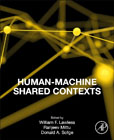
Human-machine Shared Contexts considers the foundations, metrics, and applications of human-machine systems. Editors and authors debate whether machines, humans, and systems should speak only to each other, only to humans, or to both and how. The book establishes the meaning and operation of shared contexts? between humans and machines; it also explores how human-machine systems affect targeted audiences (researchers, machines, robots, users) and society, as well as future ecosystems composed of humans and machines. This book explores how user interventions may improve the context for autonomous machines operating in unfamiliar environments or when experiencing unanticipated events; how autonomous machines can be taught to explain contexts by reasoning, inferences, or causality, and decisions to humans relying on intuition; and for mutual context, how these machines may interdependently affect human awareness, teams and society, and how these machines may be affected in turn. In short, can context be mutually constructed and shared between machines and humans? The editors are interested in whether shared context follows when machines begin to think, or, like humans, develop subjective states that allow them to monitor and report on their interpretations of reality, forcing scientists to rethink the general model of human social behavior. If dependence on machine learning continues or grows, the public will also be interested in what happens to context shared by users, teams of humans and machines, or society when these machines malfunction. As scientists and engineers think through this change in human terms, the ultimate goal is for AI to advance the performance of autonomous machines and teams of humans and machines for the betterment of society wherever these machines interact with humans or other machines. This book will be essential reading for professional, industrial, and military computer scientists and engineers; machine learning (ML) and artificial intelligence (AI) scientists and engineers, especially those engaged in research on autonomy, computational context, and human-machine shared contexts; advanced robotics scientists and engineers; scientists working with or interested in data issues for autonomous systems such as with the use of scarce data for training and operations with and without user interventions; social psychologists, scientists and physical research scientists pursuing models of shared context; modelers of the internet of things (IOT); systems of systems scientists and engineers and economists; scientists and engineers working with agent-based models (ABMs); policy specialists concerned with the impact of AI and ML on society and civilization; network scientists and engineers; applied mathematicians (e.g., holon theory, information theory); computational linguists; and blockchain scientists and engineers. Discusses the foundations, metrics, and applications of human-machine systemsConsiders advances and challenges in the performance of autonomous machines and teams of humansDebates theoretical human-machine ecosystem models and what happens when machines malfunction INDICE: 1. Introduction 2. Interaction, Analogy, and Metareasoning: Applying Cognitive Science to Robotics 3. Context: Adding Command Knowledge 'At the Human Edge' 4. Separating the Forest and The Trees - Wavelet Contextual Conditioning For AI 5. A Narrative Modeling Platform:Representing the Comprehension of Novelty in Open World Systems 6. Deciding Machines: Moral-Scene Assessment for Intelligent Systems 7. The Criticality of Social & Behavioral Science in the Development & Execution of Autonomous Systems 8. Virtual Health and Artificial Intelligence: Using Technology to Improve Healthcare Delivery 9. An Information Geometric look at the Valuing of Information 10. AI, Autonomous Machines and Human Awareness: Towards Shared Machine-Human Contexts in Medicine 11. Problems of Autonomous Agents following Informal, Open-textured Rules 12. Engineering for Emergence in Information Fusion Systems: A Review of Some Challenges 13. Integrating Expert Human Decision-Making in Articial Intelligence Applications 14. A Communication Paradigm for Human-Robot Interaction During Robot Failure Scenarios 15. On Neural-Network Training Algorithms 16. Identifying Distributed Incompetence in an Organization 17. Begin with the human: Designing for safety and trustworthiness in cyber-physica systems 18. Digital Humanities and Digital Economy 19. Human-Machine Sense Making in Context Based Computational Decision 20. Constructing Mutual Context in Human-robot Collaborative Problem-solving with Multi-modal Input
- ISBN: 978-0-12-820543-3
- Editorial: Academic Press
- Encuadernacion: Rústica
- Páginas: 300
- Fecha Publicación: 01/06/2020
- Nº Volúmenes: 1
- Idioma: Inglés
